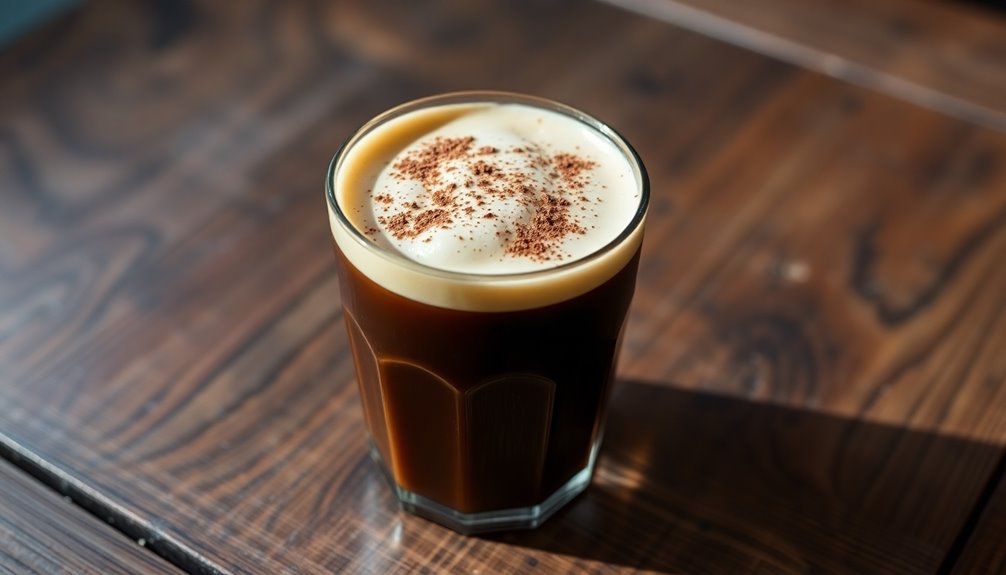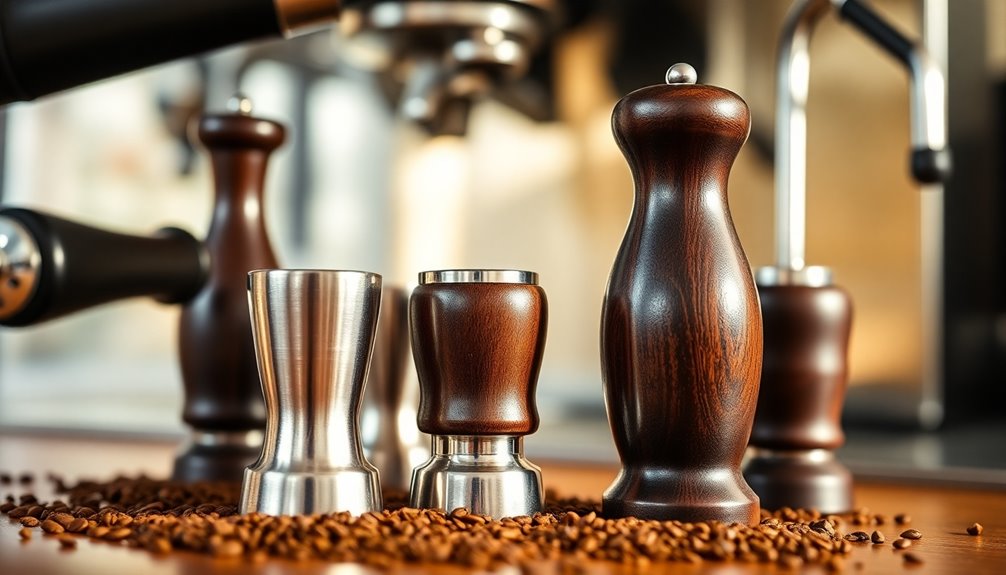Ground coffee is what you get when you grind whole coffee beans, either by hand or with a grinder. This process increases flavor extraction, allowing hot water to access the coffee's rich components. The grind size can vary from coarse to fine, tailored for different brewing methods. Choosing the right grind prevents issues like over-extraction or bitterness. Ground coffee is distinct from instant coffee, offering a fresher, more complex taste. Storing it properly is key to maintaining its quality, and there's much more to discover about how grinding impacts your coffee experience.
Key Takeaways
- Ground coffee is produced by grinding whole coffee beans, enhancing flavor extraction for brewing.
- It varies in grind size, from extra coarse to extra fine, suited for different brewing techniques.
- Freshly ground coffee retains essential oils, offering a richer flavor and aroma compared to pre-ground options.
- Unlike instant coffee, which is made from lower-quality beans, ground coffee provides a more complex taste.
- Proper storage is crucial to maintain freshness, ideally in airtight containers away from light and moisture.
Definition of Ground Coffee

Ground coffee is what you get when whole coffee beans are ground down, either by hand or with an electric grinder. This grinding process is crucial because it extracts the rich flavors locked inside the beans, allowing hot water to access those tiny coffee particles.
You’ll notice that ground coffee comes in varying coarseness levels, from extra coarse to extra fine, tailored for different brewing methods. Coarser grinds work well for French press, while finer grinds are perfect for espresso. When choosing the right coarseness for your ground coffee, it’s important to consider the brewing method you’ll be using. For example, if you’re making pour-over coffee, a medium-coarse grind is typically recommended. Additionally, it’s worth noting that while many people enjoy the benefits of decaf coffee, the coarseness of the grind can also impact the flavor and strength of the brew. Ultimately, finding the perfect grind for your preferred brewing method can greatly enhance your coffee drinking experience.
It's important to match the grind size to your brewing technique to prevent over-extraction or under-extraction. Remember, ground coffee differs from instant coffee, which goes through a unique process to create soluble granules.
Benefits of Freshly Ground Coffee
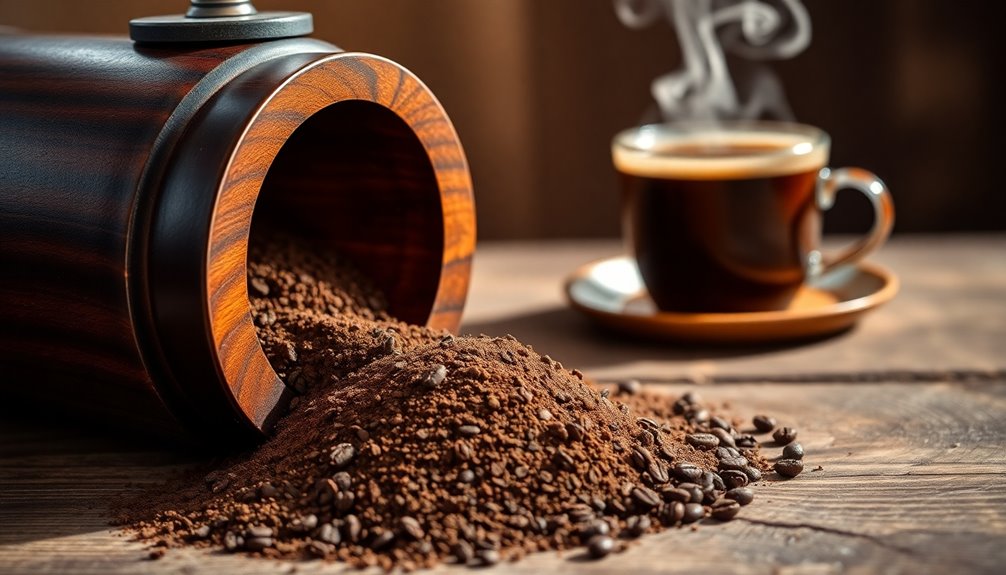
When you choose freshly ground coffee, you're not just opting for a beverage; you're elevating your entire coffee experience.
Freshly ground beans retain more essential oils, enriching the depth and complexity of your coffee's flavor profile. By minimizing oxidation, you preserve the vibrant aromas and volatile compounds that make each cup so delightful. You'll enjoy a richer, better-smelling brew. Additionally, freshly ground coffee maintains superior quality compared to pre-ground options, ensuring that each sip feels indulgent.
Plus, grinding your coffee offers consistency and quality that pre-ground options can't match. You also gain control over grind size, allowing you to customize your coffee to suit any brewing method.
Not only does this enhance your ritual, but it also supports a healthier lifestyle, as freshly ground coffee contains more antioxidants and fewer additives.
Importance of Grind Size
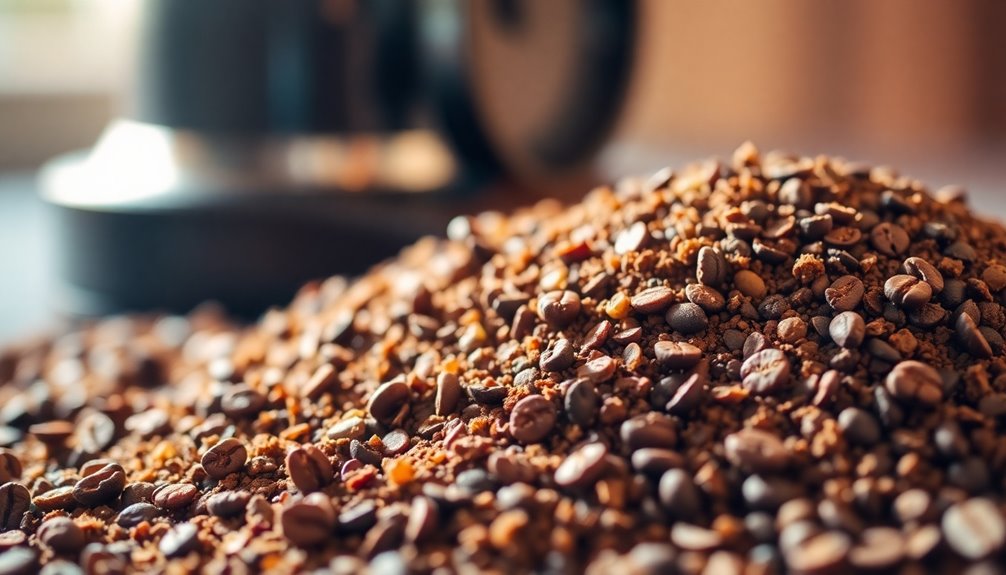
Understanding grind size is crucial for achieving the perfect cup of coffee, as it directly influences both extraction rates and flavor profiles. Finer grinds increase the surface area, leading to faster extraction of flavor compounds, while coarser grinds slow this process down. This balance is essential to avoid under-extraction, which can taste weak or sour, and over-extraction, resulting in bitterness. The grind size must match your brewing method; for instance, Turkish coffee needs fine grinds, while French press benefits from coarser ones. Additionally, the choice of grind size can significantly affect the extraction efficiency during brewing. Consistency is key, too—using a burr grinder helps maintain uniform particle sizes, ensuring even extraction. Small adjustments in grind size can significantly impact your brew's taste, so experimentation is vital to find your perfect setting.
Ground Coffee Vs Instant Coffee
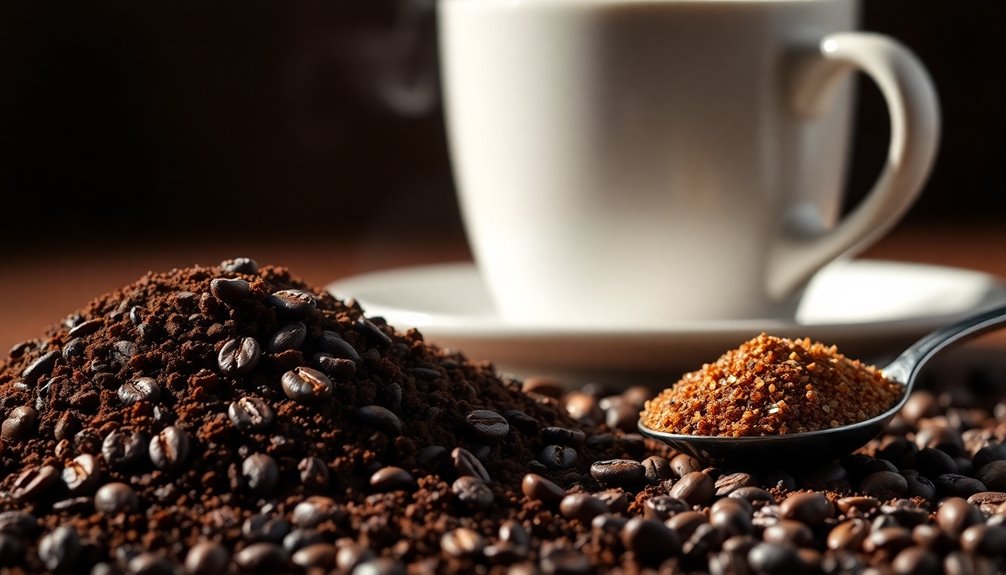
While many coffee lovers appreciate the convenience of instant coffee, there's no denying that ground coffee provides a more authentic and flavorful experience.
Ground coffee, made from carefully roasted Arabica beans, offers a complex flavor profile that instant coffee simply can't match. Instant coffee often tastes bitter and bland, primarily because it's made from lower-quality Robusta beans. Plus, ground coffee retains essential oils, resulting in a smoother, less acidic taste.
Although preparing ground coffee takes more time and effort, it's worth it for the freshness and aroma. Unlike instant coffee, which has a longer shelf life but loses flavor, freshly ground coffee delivers a richer brew.
Ultimately, if you seek quality, ground coffee is your best bet.
Impact of Grinding on Flavor

The way you grind your coffee beans plays a crucial role in determining the flavor of your brew. A fine grind increases the surface area, leading to higher extraction rates, making it perfect for methods like espresso. However, if it's too fine, you might end up with a bitter taste.
On the other hand, a coarse grind reduces extraction, ideal for longer brewing methods like French Press, resulting in a lighter-bodied flavor. If your coffee tastes weak or sour, your grind may be too coarse.
Adjusting grind size is essential to achieve the right balance of flavors. Experiment with different sizes for each brewing method to discover the flavor profile that works best for you.
Freshness and Proper Storage
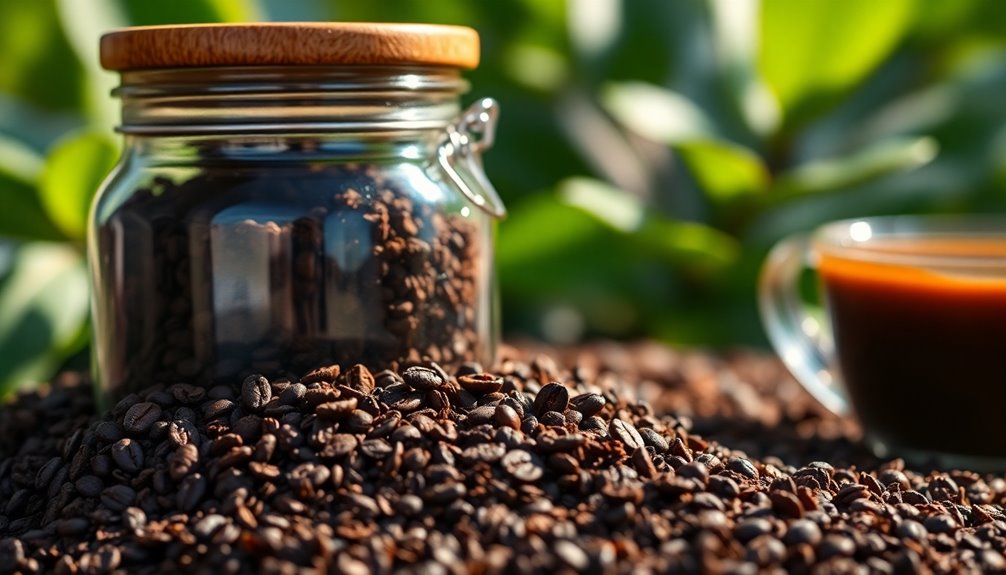
Fresh coffee is best enjoyed within a few weeks of grinding, so proper storage is essential to maintain its vibrant flavor and aroma.
Use airtight containers made of ceramic, metal, or glass to keep out moisture and odors. Avoid transparent containers as light can degrade quality. Opt for containers with a vacuum seal or one-way valve for optimal preservation, and ensure they've a snug-fitting lid.
Store your coffee in a cool, dark place, away from heat sources, sunlight, and humidity. The pantry or cupboard works best. Avoid the refrigerator due to moisture.
For long-term storage, consider freezing your coffee, but remember to only take out what you need to prevent refreezing. Label containers with the roast date for reference.
Frequently Asked Questions
How Long Does Ground Coffee Stay Fresh After Opening?
After you open a bag of ground coffee, it stays fresh for about 1-3 weeks if you store it properly.
You'll notice the flavor and aroma start to degrade noticeably after 1-2 weeks, so it's best to use it within that timeframe for optimal taste.
Keep it in an airtight container, away from heat and moisture, to preserve its freshness.
Pay attention to the smell and taste—stale coffee isn't enjoyable!
Can I Grind Coffee Beans at Home?
Absolutely, you can grind coffee beans at home!
Use a mortar and pestle for precise control or a blender for convenience. Just remember to grind in small bursts to keep the oils from overheating.
A food processor or manual grinder also works well.
Make sure to choose the right grind size for your brewing method, and always grind just before you brew for the freshest flavor.
Enjoy your homemade coffee!
What Equipment Is Needed for Grinding Coffee?
To grind coffee effectively, you'll need either a burr grinder or a blade grinder.
Burr grinders provide uniform grind sizes, which is crucial for flavor extraction, while blade grinders are more affordable but often produce inconsistent results.
If you're serious about coffee, consider investing in a conical burr grinder for precise control.
Additionally, specialized grinders exist for high-volume or specific grind styles, ensuring you have the right equipment for your brewing method.
Is There a Difference Between Espresso and Regular Ground Coffee?
Yes, there's a significant difference between espresso and regular ground coffee.
Espresso requires a very fine grind to extract a concentrated flavor under high pressure, while regular coffee uses a coarser grind for various brewing methods.
The roasting process also differs; espresso beans are roasted darker, enhancing their oils and flavor.
This results in a bolder taste for espresso, compared to the milder flavor of regular coffee brewed with lighter or medium roasts.
How Can I Tell if My Coffee Is Stale?
To tell if your coffee's stale, start by checking the roast date; it should be within two to three weeks.
Look for dry, matte beans—oily ones signal staleness.
Give it a sniff; fresh coffee smells aromatic, while stale coffee has a musty scent.
When brewing, fresh coffee blooms, releasing gases, whereas stale coffee won't.
If your brew tastes flat or bitter, it's likely time to toss that old coffee out!
Conclusion
In conclusion, understanding ground coffee can really enhance your coffee experience. Freshly ground coffee offers richer flavors and aromas, making each sip more enjoyable. By paying attention to grind size, you can tailor your brew to perfection, whether you prefer a bold espresso or a smooth pour-over. Remember to store your coffee properly to maintain its freshness. So, next time you brew, think about the impact of grinding on your cup, and savor the difference!

